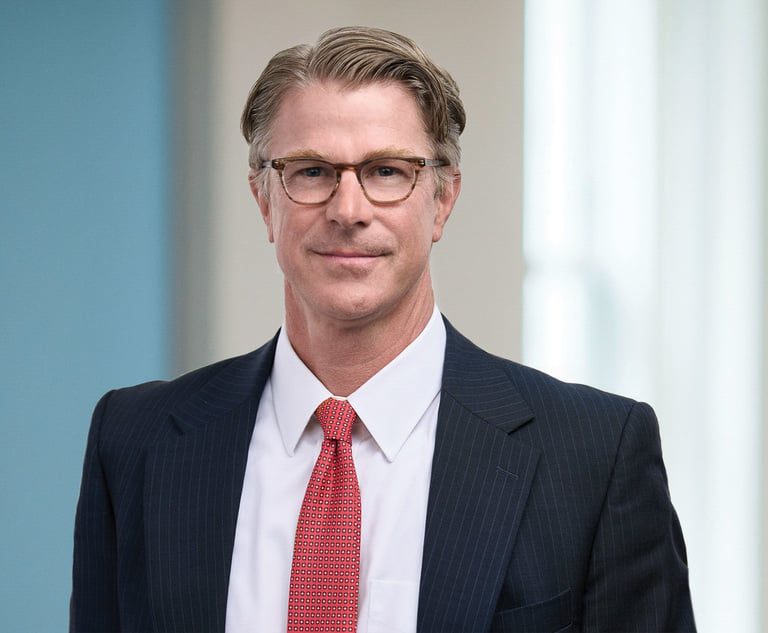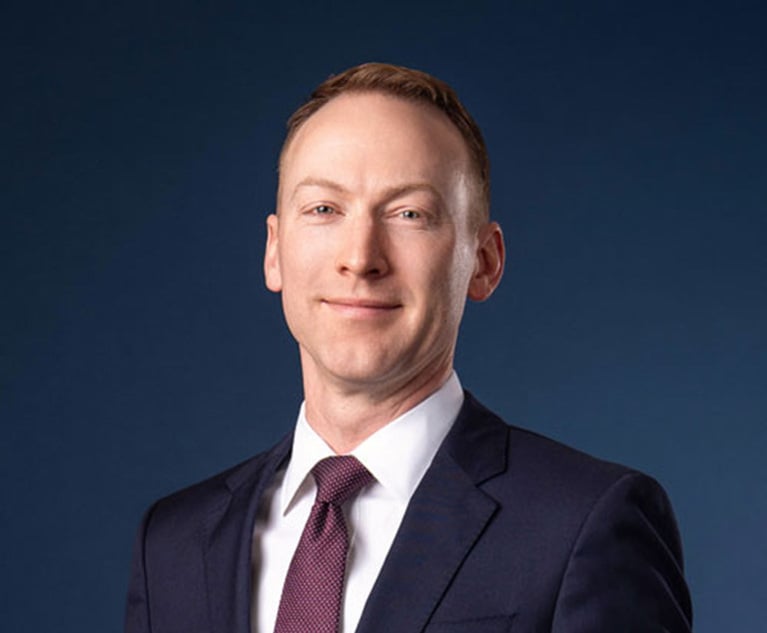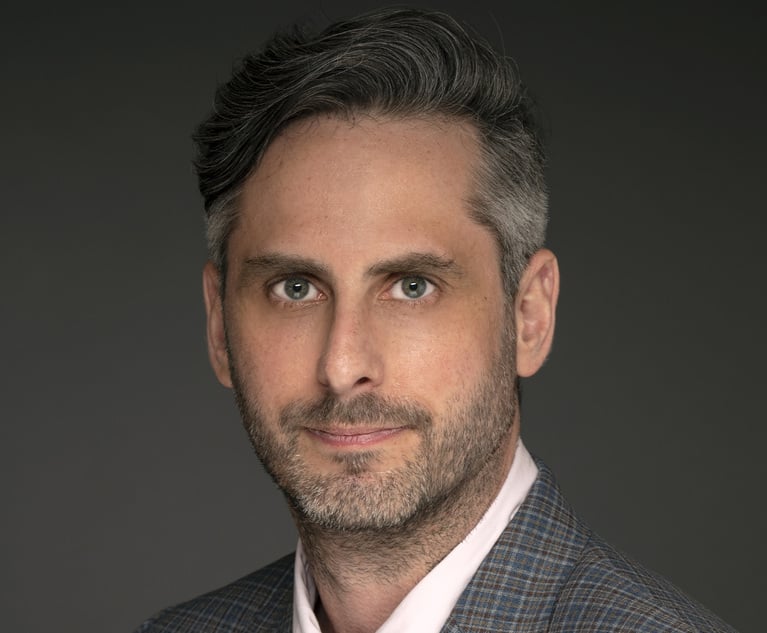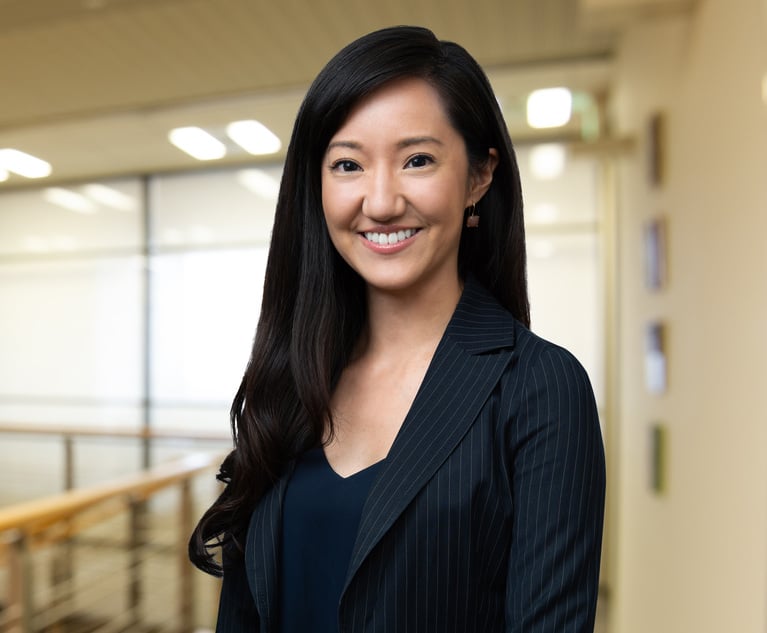How I Made Partner: Cohen Milstein Sellers & Toll's Shaylyn Cochran
"I would encourage junior attorneys to examine why they seek [partnership] and, importantly, what they plan to do once they attain [partnership]."
June 29, 2020 at 02:24 PM
8 minute read
Job title: Partner.
Practice area: Civil Rights & Employment Litigation practice.
Law school and year of graduation: Harvard Law School, 2011.
How long have you been at the firm? Since October 2012.
How long were you an associate at the firm? I was an Associate from October 2012 until December 31, 2019.
Were you an associate at another firm before joining your present firm? I previously was a Civil Rights fellow at Relman Colfax in Washington, D.C.
What year did you make partner at your current firm? I made partner in December 2019, and my election was effective January 1, 2020.
What's the biggest surprise you experienced in becoming partner? I had assumed that the transition from associate to partner would be slow and steady—that I would gradually move into new roles both in the firm and the community at large. Although this has been true with my case work, I was surprised to find that my election to Cohen Milstein's partnership almost immediately began creating new opportunities for business development, thought leadership in my bar, and mentorship. This change, and the swiftness with which it has come, has been incredibly humbling yet also exciting. I have especially appreciated the new opportunities for mentoring, an issue that is close to my heart and has made all the difference in my career to date. In the few months since I made partner, I have seen a substantial uptick in the number of junior attorneys and law students, particularly from women of color like myself, who have sought me out for advice on how to navigate their careers in public-interest lawyering. I have been thrilled to offer advice to these junior attorneys, and my hope is that my efforts, when combined with other work already being done across our bar, will help to diversify our profession over time.
Describe how you feel now about your career now that you've made partner? I am incredibly excited and humbled to be entering this new phase of my career. But it some ways, it weirdly feels like starting over again. I have likened it to transitioning from high school, where you were the big woman on campus, to becoming a college freshman, where the landscape is similar yet very different at the same time. I have spent the last 8-9 years mastering how to be an effective associate, and now that my role has changed—I'm a freshman again, albeit at a different level. Although many things remain the same or are consistent with my expectations, there still is a bit of a learning curve that I am navigating. Ultimately for me, it's an exciting time where I am able to hit the reset button and explore different opportunities to develop new skills and improve old ones. I also feel like I have a greater sense of control over career trajectory and have felt really supported throughout this entire process by all my colleagues at Cohen Milstein.
What's the key to successful business development in your opinion? Authentic relationships that develop over time. New relationships can obviously be fruitful, but in my experience, successful business development comes more regularly from older relationships which I may not have even realized I was building. Sometimes people try to artificially create connections. But if you are a good person and do good work, meaningful relationships will develop organically.
What do you think was the deciding point for the firm in making you partner? Our firm takes a holistic approach when evaluating candidates for partnership, and so I don't believe there was one specific case, connection, or personality trait that made the difference. Having strong litigation skills is essential, but other factors ostensibly come into play, such as effective management, standing in the community/bar, and having an entrepreneurial mindset. I believe that over the span of the seven and half years I have been with the firm, I checked these boxes.
What's been the biggest change, day-to-day, in your routine since becoming partner? I probably attend more meetings now, and I am more involved in some aspects of helping to manage the firm and particularly my practice group. As a result, I am spending more time thinking about how my litigation teams are stewarding the firm's resources and creating new opportunities for case development.
But in a lot of ways, my case work is not much different, which is a bit refreshing. I pitched myself as someone who was already operating as a de facto partner, quietly stepping into leadership positions at the firm and on my cases as I could over the years. For that reason, I did not expect my day-to-day routine to change dramatically. I think that serves as a reminder for junior attorneys that if you can step up on your cases, grab those opportunities. I think there was a recognition that in some ways, I was already doing this role.
Who had the greatest influence in your career that helped propel you to partner? It is hard to identify just one person, but Joe Sellers, who is chair of the firm's Civil Rights & Employment practice group, is at the top of that list. I have lost count of the number of lessons I have learned from working closely with Joe for more than seven years. The lesson I return to most often is Joe's guidance about striking the delicate balance between zealously advocating for clients while also maintaining civil, productive relationships with opposing counsel. I have watched him maintain this balance for years, and on several occasions, it has made a huge difference in our ability to advance or even resolve cases. Similarly, Betsy Miller and Victoria Nugent, co-chairs of Cohen Milstein's Public Client practice group, and Kalpana Kotagal, my partner in the Civil Rights and Employment practice group, have been continual sources of support. They all are committed to helping to develop the next generation of female leaders in our profession, and they have made invaluable contributions to my personal and professional development.
I also am indebted to countless other colleagues at Cohen Milstein, including other Partners who have supported me as part of the firm's formal mentorship program as well as the firm's amazing group of women attorneys who personify excellence in every sense of the word.
What's the best piece of advice you could give an associate who wants to make partner? First, I would challenge junior attorneys to think critically about why they want to make partner. In our profession, there sometimes can be a feeling of inertia pushing associates toward the partnership track, but because making partner at any firm requires commitment and sacrifices (not only from you but also from friends and family), I would encourage junior attorneys to examine why they seek it and, importantly, what they plan to do once they attain it. As a mentor cautioned me years ago, if you don't have a plan for yourself once you get "there" (whatever "there" may mean for you), someone else will create one for you—and you may not like the result. Second, I would challenge associates to devote time to mentoring more junior attorneys or law students. I have learned so much about myself and the type of lawyer I want to be from these mentoring relationships with junior attorneys, and this type of investment in other people only helps to strengthen our profession. It also demonstrates for your firm that you not only have the practical skills to be a partner, but you also already possess a leadership mindset and are committed to investing in people who improve the organization as a whole.
 ALM Young Professionals Network is a LinkedIn group where young professionals can find inspiration and help in dealing with those challenges we all face early in our careers. From salary negotiations to leadership to addressing diversity and inclusion issues and more, our editors will guide conversations on how tomorrow's leaders can tackle every career milestone. We are excited about this pivotal group. Click here to join.
ALM Young Professionals Network is a LinkedIn group where young professionals can find inspiration and help in dealing with those challenges we all face early in our careers. From salary negotiations to leadership to addressing diversity and inclusion issues and more, our editors will guide conversations on how tomorrow's leaders can tackle every career milestone. We are excited about this pivotal group. Click here to join.
This content has been archived. It is available through our partners, LexisNexis® and Bloomberg Law.
To view this content, please continue to their sites.
Not a Lexis Subscriber?
Subscribe Now
Not a Bloomberg Law Subscriber?
Subscribe Now
NOT FOR REPRINT
© 2024 ALM Global, LLC, All Rights Reserved. Request academic re-use from www.copyright.com. All other uses, submit a request to [email protected]. For more information visit Asset & Logo Licensing.
You Might Like
View All
How I Made Office Managing Partner: 'Be a Lawyer First, Foremost and Always,' Says Matthew McLaughlin of Venable

How I Made Practice Group Chair: 'Be a Good Partner and Colleague,' Says Logan Drew of Robins Kaplan

How the Deal Got Done: Sidley Austin and NWSL Angel City Football Club/Iger

How I Made Partner: 'Don’t Be Scared to Be Ambitious,' Says Aya Eguchi of Morrison Foerster
Law Firms Mentioned
Trending Stories
- 1Decision of the Day: Judge Reduces $287M Jury Verdict Against Harley-Davidson in Wrongful Death Suit
- 2Kirkland to Covington: 2024's International Chart Toppers and Award Winners
- 3Decision of the Day: Judge Denies Summary Judgment Motions in Suit by Runner Injured in Brooklyn Bridge Park
- 4KISS, Profit Motive and Foreign Currency Contracts
- 512 Days of … Web Analytics
Who Got The Work
Michael G. Bongiorno, Andrew Scott Dulberg and Elizabeth E. Driscoll from Wilmer Cutler Pickering Hale and Dorr have stepped in to represent Symbotic Inc., an A.I.-enabled technology platform that focuses on increasing supply chain efficiency, and other defendants in a pending shareholder derivative lawsuit. The case, filed Oct. 2 in Massachusetts District Court by the Brown Law Firm on behalf of Stephen Austen, accuses certain officers and directors of misleading investors in regard to Symbotic's potential for margin growth by failing to disclose that the company was not equipped to timely deploy its systems or manage expenses through project delays. The case, assigned to U.S. District Judge Nathaniel M. Gorton, is 1:24-cv-12522, Austen v. Cohen et al.
Who Got The Work
Edmund Polubinski and Marie Killmond of Davis Polk & Wardwell have entered appearances for data platform software development company MongoDB and other defendants in a pending shareholder derivative lawsuit. The action, filed Oct. 7 in New York Southern District Court by the Brown Law Firm, accuses the company's directors and/or officers of falsely expressing confidence in the company’s restructuring of its sales incentive plan and downplaying the severity of decreases in its upfront commitments. The case is 1:24-cv-07594, Roy v. Ittycheria et al.
Who Got The Work
Amy O. Bruchs and Kurt F. Ellison of Michael Best & Friedrich have entered appearances for Epic Systems Corp. in a pending employment discrimination lawsuit. The suit was filed Sept. 7 in Wisconsin Western District Court by Levine Eisberner LLC and Siri & Glimstad on behalf of a project manager who claims that he was wrongfully terminated after applying for a religious exemption to the defendant's COVID-19 vaccine mandate. The case, assigned to U.S. Magistrate Judge Anita Marie Boor, is 3:24-cv-00630, Secker, Nathan v. Epic Systems Corporation.
Who Got The Work
David X. Sullivan, Thomas J. Finn and Gregory A. Hall from McCarter & English have entered appearances for Sunrun Installation Services in a pending civil rights lawsuit. The complaint was filed Sept. 4 in Connecticut District Court by attorney Robert M. Berke on behalf of former employee George Edward Steins, who was arrested and charged with employing an unregistered home improvement salesperson. The complaint alleges that had Sunrun informed the Connecticut Department of Consumer Protection that the plaintiff's employment had ended in 2017 and that he no longer held Sunrun's home improvement contractor license, he would not have been hit with charges, which were dismissed in May 2024. The case, assigned to U.S. District Judge Jeffrey A. Meyer, is 3:24-cv-01423, Steins v. Sunrun, Inc. et al.
Who Got The Work
Greenberg Traurig shareholder Joshua L. Raskin has entered an appearance for boohoo.com UK Ltd. in a pending patent infringement lawsuit. The suit, filed Sept. 3 in Texas Eastern District Court by Rozier Hardt McDonough on behalf of Alto Dynamics, asserts five patents related to an online shopping platform. The case, assigned to U.S. District Judge Rodney Gilstrap, is 2:24-cv-00719, Alto Dynamics, LLC v. boohoo.com UK Limited.
Featured Firms
Law Offices of Gary Martin Hays & Associates, P.C.
(470) 294-1674
Law Offices of Mark E. Salomone
(857) 444-6468
Smith & Hassler
(713) 739-1250










